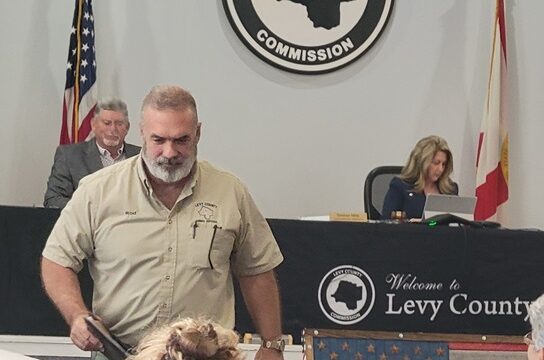By Terry Witt – Spotlight Senior Reporter
An emotional four-hour Levy County Commission budget workshop ended Tuesday with the board divided over how much money to give the Levy County Sheriff’s Office for next year’s budget, but with the agreement that the Levy County School Board should bear some of the cost of seven new school resource officers.
The school board has argued it has no responsibility to fund the additional school resource officers Sheriff Bobby McCallum says he needs to meet the requirements of the Marjory Stoneman Douglas High School Safety Act, but a letter written by Florida Sheriff’s Association General Counsel Wayne Evans, and read by McCallum at the workshop, says school boards are responsible for funding the new school resource positions.
“In conclusion, the Act requires the school districts, rather than sheriffs or county commissions, to fund the SROs (school resource officers) contemplated under the Act. To the extent that the Legislature’s appropriations fall short of fully funding these officers, then the responsibility nonetheless remains with the school districts to address the shortfall,” Evans wrote.
County Attorney Anne Bast Brown agreed school boards are responsible for funding the new SRO positions.
“It’s their responsibility to come up with the funds to work with law enforcement,” she said.
Two motions by Levy County Commissioner Matt Brooks to add $1.2 million to the sheriff’s budget failed to get a second. Commissioner Mike Joyner’ s motion for the board to table the issue and meet jointly with the school board also failed to get a second. His motion to cut the sheriff’s budget by $250,000 failed to get a second. Joyner took the gavel from Commission Chairman John Meeks at one point suggesting he make a motion. Meeks said he had no intention of making a motion and took back the gavel. The chairman of the board can’t make a motion unless he hands the gavel to the vice chair, in this case, Joyner, and temporarily gives up control of the meeting.
Commissioner Lilly Rooks’ suggestion for McCallum to return with a breakdown of how much of the $1.2 million would go to overall sheriff’s operations and how much would pay for new SRO’s won quiet support from the board without a vote. The board by that point had spent most of the afternoon debating the sheriff’s budget and funding for SRO’s. With 5 p.m. approaching, they were ready to call it quits for the day. McCallum will return with the promised breakdown of the $1.2 million showing how he would spend the money.
But time is running short for the sheriff. He must hire seven new SRO’s before the start of the school year on Aug. 13 to meet the requirements of the school safety act. His interpretation of the new state law is that every public school in Levy County and both public charter schools must be staffed by an armed sheriff’s deputy. The school board has made a decision in closed-door school safety discussions with McCallum to staff the schools only with armed deputies, not with volunteer guardians who have no arrest authority.
Brooks’ motions weren’t an attempt to tell the sheriff how to spend the $1.2 million. The county commission doesn’t have authority to earmark money in McCallum’s budget for a specific purpose. His motion would have allowed McCallum to spend the money as he saw fit, but it fell short of the sheriff’s request for $13,906,306 in next year’s budget.
McCallum has requested a $1,816,158 million increase in the 2019 budget over this year’s spending plan of $12,090,148. The sheriff estimated Brooks’ motion, if it had passed, would have left him $650,000 to $700,000 short of what he needs to hire all seven new SRO’s. Had the motion passed, McCallum said he would have gone straight to the school board to ask for the difference, but without an approved motion he will have to wait for the next county commission budget workshop on July 2.
The sheriff’s office is spending $538,000 for the school resource program in its current budget, enough for six school resource officers. All but $94,000 of the money came from the county commission budget. The remaining money was state school safety funding that passed through the school board to the county commission for the SRO program.
The school board has given the county commission $441,641 of state school safety funds to hire school resource officers in next year’s budget, but none of that money is local tax dollars. The school board says it can’t afford to spend local dollars for SRO’s to protect the county schools they operate.
But the county commission said it doesn’t have surplus money either.
At one point, Meeks asked what would happen if the county didn’t fund the additional SRO’s at all?
“What if we say no, we’re not going to do it. Are they going to indict me?” he said.
Brown responded that it’s not the county commission’s responsibility to fund the SRO’s. The responsibility falls on the school board.
Jared Blanton, finance director for the clerk’s office and budget officer for the Levy County Commission, said the sheriff’s office budget will grow to 50 percent of the general operating fund of the commission if his current request is honored.
Blanton said property values have increased 9 percent, resulting in an increase next year of $1,383,595 of additional revenue, according to property tax estimates. But he said the commission has already budgeted $462,000 of the new revenues for countywide employee raises of $155,000, health insurance increases of $58,000, increased transfers to the road department of $192,000 and Community Redevelopment payments to Cedar Key and Williston of 57,000.
Back to the subject of the sheriff’s budget, Meeks wondered out loud if the county should consider going to 10 mills of property tax, an idea that didn’t sit well with some of his fellow board members. The commission currently levies 9 mills. He also floated the idea of a Municipal Service Tax District (MSTU) to pay for law enforcement services in view of the fact that the sheriff’s office budget is expanding and there is only so much expense the general operating budget can absorb. An MSTU is a flat fee. All property owners would pay an MSTU. There are no exemptions. No action was taken. The subject was dropped.
McCallum said the crime rate increased last year by more than 12 percent and violent crime is also increasing. His officers face threats of violence every week when they respond to calls.
McCallum wrote a June 18 letter to the school board explaining his position on the issue of SRO’s.
“I know that we are all committed to the safety of our school children, teachers, school administrators and staff as required in the Safe Schools Act,” he wrote near the end of a two-page letter. “However, as Sheriff, I cannot provide the personnel and security required in the Act without the funding from the School District and/or the Board of County Commissioners.”
Board of County Commission Budget Workshop June 19, 2018
Posted June 19, 2018













